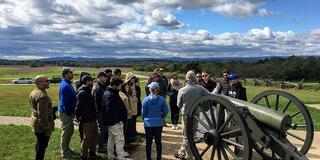Studying International Security Policy at SIPA

Nabila recently provided some great advice on choosing your concentration at SIPA. When I applied, there was no question that I was going to concentrate in International Security Policy (ISP). I was leaving the Army and was interested in continuing to work in the national security space, so it was a natural fit. But I suspect many of you have a wider range of interests or are interested in potentially pivoting to a new career path, and in those cases it’s so important to get a feel for the curriculum and culture of each concentration so that you can find your best fit. I’m going to hopefully assist in that regard by giving you an overview of the ISP concentration and also dispel some pervasive myths and stereotypes.
Doesn’t everyone in ISP have military or government experience? Will I fit in?
The most common myth is that everyone in ISP is a veteran or someone who wants to follow a very defined path into the government. This couldn’t be further from the truth. As Leon Trotsky noted, “You may not be interested in war, but war is interested in you.” Whatever your career aspirations, security issues affect every sector and understanding issues of war and peace is essential to anyone that desires to one day lead in government, international non-profits, or even private sector companies. I have friends in ISP that have backgrounds as Army Special Forces Officers, private sector consultants, paralegals, diplomats, and human rights workers. And as far as coursework, the concentration requires no prior academic training in international security or any particular professional background. For more on the diverse backgrounds of ISP concentrators, read this great blog post by ISP graduate Samantha Taylor.
What career paths do ISP students pursue after SIPA?
ISP students are prepared for a wide range of career paths in U.S. and foreign government agencies, intelligence, think tanks, defense analysis, cybersecurity, consulting, journalism, legislative staffs, and international organizations. For U.S. students, the majority of these positions are in Washington, D.C., but there are increasingly opportunities in New York City as well, especially in cybersecurity.
What are the courses like?
Almost all of your ISP courses will be small seminars of 10-20 students. Columbia offers more courses in security studies than all but a few other universities, and SIPA and the Political Science department (you can take graduate level Political Science courses while at SIPA) have numerous full-time faculty members focused on security issues. During your two-year program, there will be approximately 30-40 ISP courses to choose from. The courses cover a wide variety of areas including intelligence, cybersecurity, defense analysis, conflict resolution, peacekeeping, terrorism, and regional issues, among others. You can view the entire curriculum here, but the best way to see what ISP courses are like is to experience one for yourself. This semester, ISP courses available for class visits include War, Peace, and Strategy; Methods of Defense Analysis; Contemporary Russian Security Policy (taught by the former Deputy Assistant Director of CIA for Europe and Eurasia); Intelligence and War; and several others. Register for a class visit here!
What extracurricular opportunities does ISP offer?
The ISP concentration starts off the year with an annual fall retreat to a campground north of New York City. I went my first year, and it was a great way to meet classmates, second year students, and several professors. In the spring, the concentration usually takes one trip to DC or a military installation. Last year, the trip was a staff ride to Gettysburg and the U.S. Army War College led by Professor Stephen Biddle. There is also a spring crisis simulation held at SIPA and run by ISP students. Last year, students explored the conflict in Yemen in a realistic, one-day simulation. There are also an unending amount of incredible guest speakers that come to Columbia, and many of those of interest to ISP students are hosted by the Saltzman Institute of War and Peace Studies. Just in the past year, students have attended events with former Director of National Intelligence Jim Clapper, NATO Secretary General Jens Stoltenberg, and former Deputy Secretary of State William Burns.